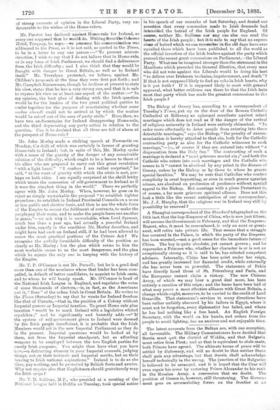Mr. John Marley made a striking speech at Newcastle on
Monday, t'm drift of which was certainly in favour of granting Home-rule to Ireland; but, in spite of this, Mr. Morley spoke with a sense of the gravity of the danger of any conceivable solution of the difficulty, which ought to be a lesson to those of his allies who are prepared to carry out this great revolution "with a light heart." "I confess I am rather surprised," he said, " at the want of gravity with which the crisis is met, per- haps on both sides. I am equally surprised at the shrill levity which treats the concession of sell-government to Ireland as if it were the simplest thing in the world." There we perfectly agree with MT. John Morley. When, however, he goes on to reject as simply unworkable the proposal "to establish tighter procedure ; to establish in Ireland Provincial Councils on a more or less public and elective basis, and then to use the whole force of the Empire to secure the fulfilment of contracts, to make the people pay their rents, and to make the people leave one another in peace,"—we ask why it is unworkable, when Lord Spencer, much less than a year ago, had actually a peaceful Ireland under him, exactly in the condition Mr. Morley describes, and might have had such an Ireland still, if he had been allowed to renew the most practical portions of the Crimes Act ? We recognise the awfully formidable difficulty of the position as clearly as Mr. Morley ; but the plan which seems to him the most workable seems to us the most dangerous, and the plan which he rejects the only one in keeping with the history of the Empire.


































 Previous page
Previous page